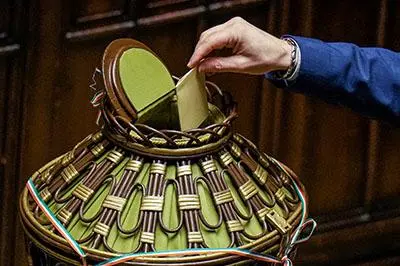PHOTO
ROME - Italy's political parties will hold a third round of voting on Wednesday to elect a new head of state, but with the parties at loggerheads over a mutually acceptable candidate it is almost certain to be inconclusive.
The race for the prestigious, seven-year role is wide open and neither the centre-right nor the centre-left bloc have enough votes to ram through their candidate, meaning some sort of compromise deal will be needed.
Prime Minister Mario Draghi remains in the frame but worries that his promotion to president might cause his coalition government to disintegrate and trigger early elections have clouded his prospects.
"We would have weeks of confusion if Draghi were to leave the government ... it would be a problem amid a health crisis, an energy crisis, an economic crisis," said rightist League leader Matteo Salvini on Wednesday.
Of the main party chiefs the only one that is publicly supporting Draghi's candidacy for president is Enrico Letta of the centre-left Democratic Party.
The president has a powerful role. He has the final say in naming the prime minister and is often called on to resolve political crises in the euro zone's third largest economy, where governments survive barely a year on average.
The third round of voting will begin at 1000 GMT. A majority of the 1,009 lawmakers and regional delegates cast blank ballots on the first two days, a way of playing for time while negotiations go on.
Most are expected to do the same on Wednesday.
A successful candidate needs a two-thirds majority in any of the first three rounds of voting, with the threshold lowered to an absolute majority in subsequent rounds. Parliament plans to hold one ballot a day.
The race will get more serious on Thursday, when the threshold for victory falls.
On Tuesday, the centre-right bloc put forward three candidates from its ranks - a former Senate speaker, a former mayor of Milan, and a retired magistrate - but the centre-left coalition dismissed the trio and called for further talks.
Should Draghi fail to land the job of head of state, some commentators are suggesting he may not want to continue as prime minister either, if the multi-party coalition backing his government splits over the presidential election.
Alternative names floated in the media for head of state include former lower house speaker Pier Ferdinando Casini, former premier Giuliano Amato and Senate speaker Elisabetta Casellati, who is favoured by many on the right.
"The Senate speaker is the second most important state official, she does not need to be a candidate, if one calls on her I think she is available," Salvini said.
Some politicians have said they want outgoing President Sergio Mattarella to accept a second mandate. He has ruled this out.
(Reporting by Angelo Amante, editing by Gavin Jones and) ((Angelo.Amante@thomsonreuters.com;))





















